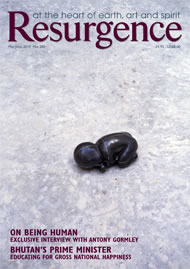In a recent interview, the poet Lee Harwood defends his Welsh landscape poems against the charge of pastoral sentimentality. “It’s not in any sense an escape,” he says. “It’s a real place and the rocks are there and the trees are there… Most of us do live in an urban setting, but that doesn’t mean you can deny what’s outside the cities or that that hasn’t got an immense presence in our lives.”
Kim Taplin has been writing about the reality of that ‘immense presence’ for over thirty years, although the forms she has utilised – poems, fiction, essays, and a full-length history of footpaths in literature – have been impressively varied. In her new book, her skill and experience have shaped something special.
Walking Aloud is about ‘ambling’, which is rural walking without the pressure of a fixed destination, because we’re already there; or will be, if we allow it. And what we find there is what our ‘souls’ thirst for. Starting from the ancient hamlet that has been Taplin’s home for forty years, we accompany her through a “small rough diamond” of Oxfordshire, usually in the early morning, “a time for being solitary, for slipping out of the house to find something that by 8 o’clock will have vanished”.
The life of the book is in its perfectly managed prose style. The small geographical area doesn’t limit the stream of observations, memories, histories and emotions which flow through the words. We are what we attend to; and walking encourages attention. The attention here is on the natural world, but also on the responses of a mind moving, recorded so seamlessly, so lightly that we feel no jarring at all.
Taplin writes out of a British tradition of visionary Nature writers and walkers: Blake, Clare, Hardy, Edward Thomas. The discursive nature of her prose, plus the ability to observe and describe directly, shows some influence from Richard Jefferies. Like Jefferies in his time (but without his occasional alienated bitterness) she also has a contemporary political agenda. Ecologically, she perceives that damage to our natural environment is damage to ourselves, physically, emotionally and spiritually. There’s also the right of women to walk unmolested, allied to a more general concern about violence and aggression, personified by a persistent teenage vandal called Darren. Home and family sustain and motivate her sense of the value of community. But again, paradoxically, she has that poetic need of the soul to create, to amble, to be, alone.
Walking Aloud is also an accessible sociological description of the oddities and contradictions of modern English rural life. And it’s often great fun, celebrating the fact that here and now we can increase our awareness, and thereby enlarge our selves. Seeing the world in a grain of sand – or a small rough diamond of Oxfordshire – confirms that the joys and pains of life, personal and communal, are all present at any given point, exactly where we are, if we can but see it.
Lee Harwood’s interview is in Not the Full Story by Kelvin Corcoran (Shearsman Books, 2008).






